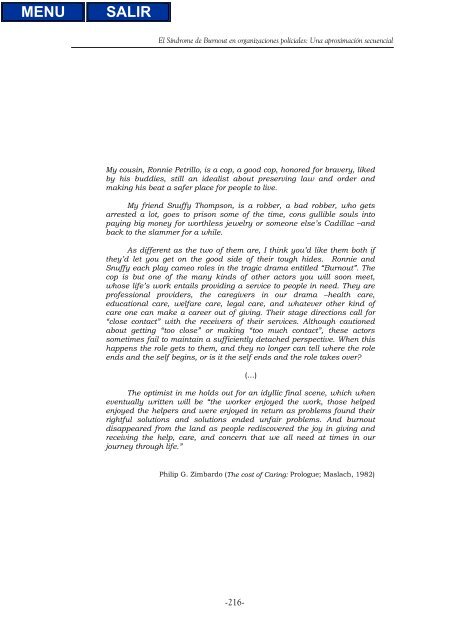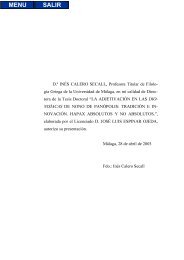- Page 1 and 2:
UNIVERSIDAD DE MÁLAGA Facultad de
- Page 3 and 4:
Thalassa, Thalassa Únicamente he e
- Page 5 and 6:
3. El Síndrome de “Quemarse por
- Page 7 and 8:
Prefacio El acercamiento a la activ
- Page 9 and 10:
entre el estrés y la cultura de la
- Page 11 and 12:
Introducción
- Page 13 and 14:
-3- Introducción En el decurso his
- Page 15 and 16:
-5- Introducción rudimentaria- de
- Page 17 and 18:
-7- Introducción Si la Revolución
- Page 19 and 20:
-9- Introducción trata, como indic
- Page 21 and 22:
-11- Introducción Sin embargo, no
- Page 23 and 24:
El Síndrome de Burnout en organiza
- Page 25 and 26:
El Síndrome de Burnout en organiza
- Page 27 and 28:
El Síndrome de Burnout en organiza
- Page 29 and 30:
El Síndrome de Burnout en organiza
- Page 31 and 32:
El Síndrome de Burnout en organiza
- Page 33 and 34:
El Síndrome de Burnout en organiza
- Page 35 and 36:
El Síndrome de Burnout en organiza
- Page 37 and 38:
El Síndrome de Burnout en organiza
- Page 39 and 40:
El Síndrome de Burnout en organiza
- Page 41 and 42:
El Síndrome de Burnout en organiza
- Page 43 and 44:
El Síndrome de Burnout en organiza
- Page 45 and 46:
El Síndrome de Burnout en organiza
- Page 47 and 48:
El Síndrome de Burnout en organiza
- Page 49 and 50:
El Síndrome de Burnout en organiza
- Page 51 and 52:
El Síndrome de Burnout en organiza
- Page 53 and 54:
El Síndrome de Burnout en organiza
- Page 55 and 56:
El Síndrome de Burnout en organiza
- Page 57 and 58:
Capítulo 2. Estrés en el ámbito
- Page 59 and 60:
El Síndrome de Burnout en organiza
- Page 61 and 62:
El Síndrome de Burnout en organiza
- Page 63 and 64:
El Síndrome de Burnout en organiza
- Page 65 and 66:
El Síndrome de Burnout en organiza
- Page 67 and 68:
El Síndrome de Burnout en organiza
- Page 69 and 70:
∙ Modelo epidemiológico. El Sín
- Page 71 and 72:
El Síndrome de Burnout en organiza
- Page 73 and 74:
El Síndrome de Burnout en organiza
- Page 75 and 76:
El Síndrome de Burnout en organiza
- Page 77 and 78:
El Síndrome de Burnout en organiza
- Page 79 and 80:
El Síndrome de Burnout en organiza
- Page 81 and 82:
El Síndrome de Burnout en organiza
- Page 83 and 84:
El Síndrome de Burnout en organiza
- Page 85 and 86:
El Síndrome de Burnout en organiza
- Page 87 and 88:
El Síndrome de Burnout en organiza
- Page 89 and 90:
El Síndrome de Burnout en organiza
- Page 91 and 92:
El Síndrome de Burnout en organiza
- Page 93 and 94:
El Síndrome de Burnout en organiza
- Page 95 and 96:
El Síndrome de Burnout en organiza
- Page 97 and 98:
El Síndrome de Burnout en organiza
- Page 99 and 100:
El Síndrome de Burnout en organiza
- Page 101 and 102:
El Síndrome de Burnout en organiza
- Page 103 and 104:
El Síndrome de Burnout en organiza
- Page 105 and 106:
El Síndrome de Burnout en organiza
- Page 107 and 108:
El Síndrome de Burnout en organiza
- Page 109 and 110:
El Síndrome de Burnout en organiza
- Page 111 and 112:
Capítulo 3. El Síndrome de “Que
- Page 113 and 114:
Capítulo 3. El Síndrome de “Que
- Page 115 and 116:
Capítulo 3. El Síndrome de “Que
- Page 117 and 118:
Capítulo 3. El Síndrome de “Que
- Page 119 and 120:
Capítulo 3. El Síndrome de “Que
- Page 121 and 122:
Capítulo 3. El Síndrome de “Que
- Page 123 and 124:
Capítulo 3. El Síndrome de “Que
- Page 125 and 126:
Capítulo 3. El Síndrome de “Que
- Page 127 and 128:
Capítulo 3. El Síndrome de “Que
- Page 129 and 130:
Capítulo 3. El Síndrome de “Que
- Page 131 and 132:
Capítulo 3. El Síndrome de “Que
- Page 133 and 134:
Capítulo 3. El Síndrome de “Que
- Page 135 and 136:
Capítulo 3. El Síndrome de “Que
- Page 137 and 138:
Capítulo 3. El Síndrome de “Que
- Page 139 and 140:
Capítulo 3. El Síndrome de “Que
- Page 141 and 142:
Capítulo 3. El Síndrome de “Que
- Page 143 and 144:
Capítulo 3. El Síndrome de “Que
- Page 145 and 146:
Capítulo 3. El Síndrome de “Que
- Page 147 and 148:
Capítulo 3. El Síndrome de “Que
- Page 149 and 150:
Capítulo 3. El Síndrome de “Que
- Page 151 and 152:
Capítulo 3. El Síndrome de “Que
- Page 153 and 154:
Capítulo 3. El Síndrome de “Que
- Page 155 and 156:
Capítulo 3. El Síndrome de “Que
- Page 157 and 158:
Capítulo 3. El Síndrome de “Que
- Page 159 and 160:
Capítulo 3. El Síndrome de “Que
- Page 161 and 162:
Apoyo del supervisor y compañeros
- Page 163 and 164:
Capítulo 3. El Síndrome de “Que
- Page 165 and 166:
Capítulo 3. El Síndrome de “Que
- Page 167 and 168:
Capítulo 3. El Síndrome de “Que
- Page 169 and 170:
Capítulo 3. El Síndrome de “Que
- Page 171 and 172:
Variables de personalidad. Capítul
- Page 173 and 174:
Capítulo 3. El Síndrome de “Que
- Page 175 and 176: Capítulo 3. El Síndrome de “Que
- Page 177 and 178: Capítulo 3. El Síndrome de “Que
- Page 179 and 180: Capítulo 3. El Síndrome de “Que
- Page 181 and 182: Capítulo 3. El Síndrome de “Que
- Page 183 and 184: Capítulo 3. El Síndrome de “Que
- Page 185 and 186: Capítulo 3. El Síndrome de “Que
- Page 187 and 188: Capítulo 3. El Síndrome de “Que
- Page 189 and 190: Capítulo 3. El Síndrome de “Que
- Page 191 and 192: Capítulo 3. El Síndrome de “Que
- Page 193 and 194: Capítulo 3. El Síndrome de “Que
- Page 195 and 196: Capítulo 3. El Síndrome de “Que
- Page 197 and 198: Capítulo 3. El Síndrome de “Que
- Page 199 and 200: Capítulo 3. El Síndrome de “Que
- Page 201 and 202: Capítulo 3. El Síndrome de “Que
- Page 203 and 204: Consecuencias para el sujeto. Capí
- Page 205 and 206: Capítulo 3. El Síndrome de “Que
- Page 207 and 208: Capítulo 3. El Síndrome de “Que
- Page 209 and 210: Capítulo 3. El Síndrome de “Que
- Page 211 and 212: Capítulo 3. El Síndrome de “Que
- Page 213 and 214: Capítulo 3. El Síndrome de “Que
- Page 215 and 216: Capítulo 3. El Síndrome de “Que
- Page 217 and 218: Capítulo 3. El Síndrome de “Que
- Page 219 and 220: Capítulo 3. El Síndrome de “Que
- Page 221 and 222: Capítulo 3. El Síndrome de “Que
- Page 223 and 224: Capítulo 3. El Síndrome de “Que
- Page 225: Capítulo 4. Estrés y Burnout en l
- Page 229 and 230: Capítulo 4. Estrés y Burnout en l
- Page 231 and 232: Capítulo 4. Estrés y Burnout en l
- Page 233 and 234: Capítulo 4. Estrés y Burnout en l
- Page 235 and 236: Capítulo 4. Estrés y Burnout en l
- Page 237 and 238: Capítulo 4. Estrés y Burnout en l
- Page 239 and 240: Capítulo 4. Estrés y Burnout en l
- Page 241 and 242: Capítulo 4. Estrés y Burnout en l
- Page 243 and 244: Capítulo 4. Estrés y Burnout en l
- Page 245 and 246: Capítulo 4. Estrés y Burnout en l
- Page 247 and 248: Capítulo 4. Estrés y Burnout en l
- Page 249 and 250: Capítulo 4. Estrés y Burnout en l
- Page 251 and 252: Capítulo 4. Estrés y Burnout en l
- Page 253 and 254: Capítulo 4. Estrés y Burnout en l
- Page 255 and 256: Capítulo 4. Estrés y Burnout en l
- Page 257 and 258: Capítulo 4. Estrés y Burnout en l
- Page 259 and 260: Capítulo 4. Estrés y Burnout en l
- Page 261 and 262: Capítulo 4. Estrés y Burnout en l
- Page 263 and 264: Capítulo 4. Estrés y Burnout en l
- Page 265 and 266: Capítulo 4. Estrés y Burnout en l
- Page 267 and 268: Capítulo 4. Estrés y Burnout en l
- Page 269 and 270: Capítulo 4. Estrés y Burnout en l
- Page 271 and 272: Capítulo 4. Estrés y Burnout en l
- Page 273 and 274: Capítulo 4. Estrés y Burnout en l
- Page 275 and 276: Capítulo 4. Estrés y Burnout en l
- Page 277 and 278:
Capítulo 4. Estrés y Burnout en l
- Page 279 and 280:
Capítulo 4. Estrés y Burnout en l
- Page 281 and 282:
Capítulo 4. Estrés y Burnout en l
- Page 283 and 284:
Estudio empírico
- Page 285 and 286:
Capítulo 5. Estudio empírico: Una
- Page 287 and 288:
Capítulo 5. Estudio empírico: Una
- Page 289 and 290:
Capítulo 5. Estudio empírico: Una
- Page 291 and 292:
Capítulo 5. Estudio empírico: Una
- Page 293 and 294:
Capítulo 5. Estudio empírico: Una
- Page 295 and 296:
Capítulo 5. Estudio empírico: Una
- Page 297 and 298:
Capítulo 5. Estudio empírico: Una
- Page 299 and 300:
Capítulo 5. Estudio empírico: Una
- Page 301 and 302:
Capítulo 5. Estudio empírico: Una
- Page 303 and 304:
Capítulo 5. Estudio empírico: Una
- Page 305 and 306:
Capítulo 5. Estudio empírico: Una
- Page 307 and 308:
Capítulo 5. Estudio empírico: Una
- Page 309 and 310:
Capítulo 5. Estudio empírico: Una
- Page 311 and 312:
Capítulo 5. Estudio empírico: Una
- Page 313 and 314:
Capítulo 5. Estudio empírico: Una
- Page 315 and 316:
Capítulo 5. Estudio empírico: Una
- Page 317 and 318:
Capítulo 5. Estudio empírico: Una
- Page 319 and 320:
Capítulo 5. Estudio empírico: Una
- Page 321 and 322:
Capítulo 5. Estudio empírico: Una
- Page 323 and 324:
Capítulo 5. Estudio empírico: Una
- Page 325 and 326:
Capítulo 5. Estudio empírico: Una
- Page 327 and 328:
Capítulo 5. Estudio empírico: Una
- Page 329 and 330:
Capítulo 5. Estudio empírico: Una
- Page 331 and 332:
Capítulo 5. Estudio empírico: Una
- Page 333 and 334:
Capítulo 5. Estudio empírico: Una
- Page 335 and 336:
Capítulo 5. Estudio. Una aproximac
- Page 337 and 338:
Capítulo 5. Estudio. Una aproximac
- Page 339 and 340:
Capítulo 5. Estudio. Una aproximac
- Page 341 and 342:
Capítulo 5. Estudio. Una aproximac
- Page 343 and 344:
Capítulo 5. Estudio. Una aproximac
- Page 345 and 346:
Capítulo 5. Estudio. Una aproximac
- Page 347 and 348:
Capítulo 5. Estudio. Una aproximac
- Page 349 and 350:
Capítulo 5. Estudio. Una aproximac
- Page 351 and 352:
Capítulo 5. Estudio. Una aproximac
- Page 353 and 354:
Capítulo 5. Estudio. Una aproximac
- Page 355 and 356:
Capítulo 5. Estudio. Una aproximac
- Page 357 and 358:
Socialización de Rol Significado y
- Page 359 and 360:
Satisfacción El Síndrome de Burno
- Page 361 and 362:
El Síndrome de Burnout en organiza
- Page 363 and 364:
El Síndrome de Burnout en organiza
- Page 365 and 366:
El Síndrome de Burnout en organiza
- Page 367 and 368:
El Síndrome de Burnout en organiza
- Page 369 and 370:
El Síndrome de Burnout en organiza
- Page 371 and 372:
El Síndrome de Burnout en organiza
- Page 373 and 374:
El Síndrome de Burnout en organiza
- Page 375 and 376:
-364- Cuestionario Anexos Le presen
- Page 377 and 378:
-366- Cuestionario Anexos A continu
- Page 379 and 380:
-368- Cuestionario Anexos Queremos
- Page 381 and 382:
Recuerde que: 1 Totalmente FALSO 2
- Page 383 and 384:
Recuerde que: 1 Totalmente FALSO 2
- Page 385 and 386:
-374- Cuestionario Anexos A continu
- Page 387 and 388:
-376- Cuestionario Anexos A continu
- Page 389 and 390:
-378- Bibliografía Abdel-Halim, A.
- Page 391 and 392:
-380- Bibliografía Bandura, A. (19
- Page 393 and 394:
-382- Bibliografía Brissie, J., Ho
- Page 395 and 396:
-384- Bibliografía Cahoon, A.R. y
- Page 397 and 398:
-386- Bibliografía Cooper, C.L. (1
- Page 399 and 400:
-388- Bibliografía Dolan, A. (1987
- Page 401 and 402:
-390- Bibliografía Folkman, S. y L
- Page 403 and 404:
-392- Bibliografía García, M., Ll
- Page 405 and 406:
-394- Bibliografía Greenglass, E.,
- Page 407 and 408:
-396- Bibliografía Holland, P., Mi
- Page 409 and 410:
-398- Bibliografía Johns, B. (1998
- Page 411 and 412:
-400- Bibliografía Koniarek, J. y
- Page 413 and 414:
-402- Bibliografía Leong, C.S., Fu
- Page 415 and 416:
-404- Bibliografía Maslach, C. y J
- Page 417 and 418:
-406- Bibliografía Moreno, B. y Pe
- Page 419 and 420:
-408- Bibliografía Peiró, J.M., M
- Page 421 and 422:
-410- Bibliografía Ramos, J.; Mont
- Page 423 and 424:
-412- Bibliografía Schaufeli, W.B.
- Page 425 and 426:
-414- Bibliografía Smith, D. y Tzi
- Page 427 and 428:
-416- Bibliografía Turrado, M. (19
- Page 429:
-418- Bibliografía Whitehead, J.T.

















